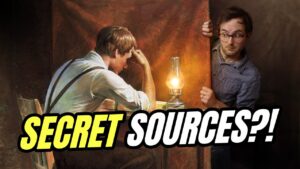Reviews
User Score
Rate This
Descriptions:
This episode covers some of the major events of Christian history between about 1300 AD until 1805 AD. Dave talks about the Western Schism (different from the “Great Schism” discussed in the previous episode), the Reformers (including Martin Luther and others), and some events from the Reformation period.
Transcript of this episode and possibly additional notes on our website: https://bit.ly/2B2zD8N
More on Martin Luther: http://bit.ly/2VZOxVY / http://bit.ly/3aK38cf
More on John Wycliffe: http://bit.ly/3aHxGLI
More on Jan Hus (John Huss): http://bit.ly/2wEsjhF
More on John Calvin: http://bit.ly/2TNbpVQ
More on William Tyndale: http://bit.ly/2W8nlUK
Read Martin Luther’s 95 Theses: http://bit.ly/2U4GnZV
More on the Western Schism: http://bit.ly/38zjYJ5 / http://bit.ly/2TAjmPa
More on the Council of Pisa (ended Western Schism): http://bit.ly/2IB6odQ
More on Indulgences: http://bit.ly/2vQSJfX / http://bit.ly/2v8IdAr / http://bit.ly/332rM5b
Information on Joseph Smith’s heritage via “Joseph Smith’s New England Heritage,” by Richard Lloyd Anderson.
NOTES:
-According to the Catechism of the Catholic Church, an indulgence is “a remission before God of the temporal punishment due to sins whose guilt has already been forgiven, which the faithful Christian who is duly disposed gains under certain prescribed conditions through the action of the Church which, as the minister of redemption, dispenses and applies with authority the treasury of the satisfactions of Christ and the saints.
“‘An indulgence is partial or plenary according as it removes either part or all of the temporal punishment due to sin.’ Indulgences may be applied to the living or the dead.
“To understand this doctrine and practice of the Church, it is necessary to understand that sin has a double consequence. Grave sin deprives us of communion with God and therefore makes us incapable of eternal life, the privation of which is called the ‘eternal punishment’ of sin. On the other hand every sin, even venial, entails an unhealthy attachment to creatures, which must be purified either here on earth, or after death in the state called Purgatory. This purification frees one from what is called the ‘temporal punishment’ of sin” (Catechism of the Catholic Church, p. 411, Image/Doubleday, 1995).
In order to earn an indulgence, one may perform “works of piety or religion (such as a pilgrimage),” “works of mercy or charity,” or “acts of penance (such as fasting).” Source: http://bit.ly/332rM5b
A popular “act of charity” in the age of the Reformers was the donation of money to the Catholic Church, but many saw it as the sin of simony, or the selling of spiritual things. With time, not only would your “donation” reduce your own temporal punishment, but it could also reduce the punishment of a deceased loved one. Many members of the clergy abused the system.
More information: http://bit.ly/2vQSJfX
-I didn’t mention Martin Luther’s death in this episode as it was rather unremarkable. Martin didn’t stay in Wartburg castle for the rest of his days. A combination of circumstances actually allowed him to eventually live a relatively public life. Powerful German figures were on Martin’s side (taking Martin may have sparked a war), reformist ideas had sunk in at a grassroots level (taking Martin could have incited a rebellion), and, due to a variety of factors, the papacy’s power during this time had been weakened (may not have had adequate resources to take Martin and deal with the consequences).
-I didn’t have time to mention John Calvin, the father of Calvinism. He and Luther likely didn’t know each other personally, though Luther’s teachings were surely influential and laid a lot of groundwork for Calvinism. More on John Calvin here: http://bit.ly/2TNbpVQ , and more on Luther’s influence over Calvinism here: http://bit.ly/2TPEL5Y
-I also didn’t mention William Tyndale, who was massively important. More info on him here: http://bit.ly/2W8nlUK
-The Church of England was not immediately a hugely protestant organization. It started out as largely Catholic (except not overseen by the pope and some other minor differences) but incorporated more reformist beliefs over time.
-Actually both of Joseph Smith’s grandfathers (Solomon Mack on his mom’s side, and Asael Smith on his dad’s side) fought in the Revolutionary War, and survived.
SUBSCRIBE:
http://saintsunscripted/subscribe
Follow Us:
Facebook: https://www.facebook.com/SaintsUnscripted/
Instagram: https://www.instagram.com/saintsunscripted/
Twitter: https://twitter.com/SaintsUnscript
Follow the Hosts:
Kwaku: https://www.instagram.com/kwakuel/
Justin: https://www.instagram.com/motioncoaster/
Mimi: https://www.instagram.com/mimi.bascom/
David: https://www.instagram.com/davidesnell/
The Sunday Pews (by David): https://www.instagram.com/thesundaypews/










